MNGT2005 Leadership and Ethics: A Reflective Essay on Leadership
VerifiedAdded on 2022/11/16
|7
|2290
|420
Essay
AI Summary
This essay reflects on a student's leadership experience within an organization, specifically addressing employee morale and productivity. The student, acting as a manager, implemented changes to reduce working hours to improve job satisfaction and focus. The essay then applies leadership theories, including contingency theory and transformational leadership, to analyze the situation. It also incorporates Maslow's hierarchy of needs to explain employee motivation. Furthermore, the essay explores the importance of ethical leadership, emphasizing fairness, honesty, and positive use of power. The student recommends ethical practices such as team spirit and community development. The essay concludes by highlighting the importance of ethical leadership in building trust and motivating employees, providing a critical analysis of the student's leadership approach and offering recommendations for ethical leadership practices.
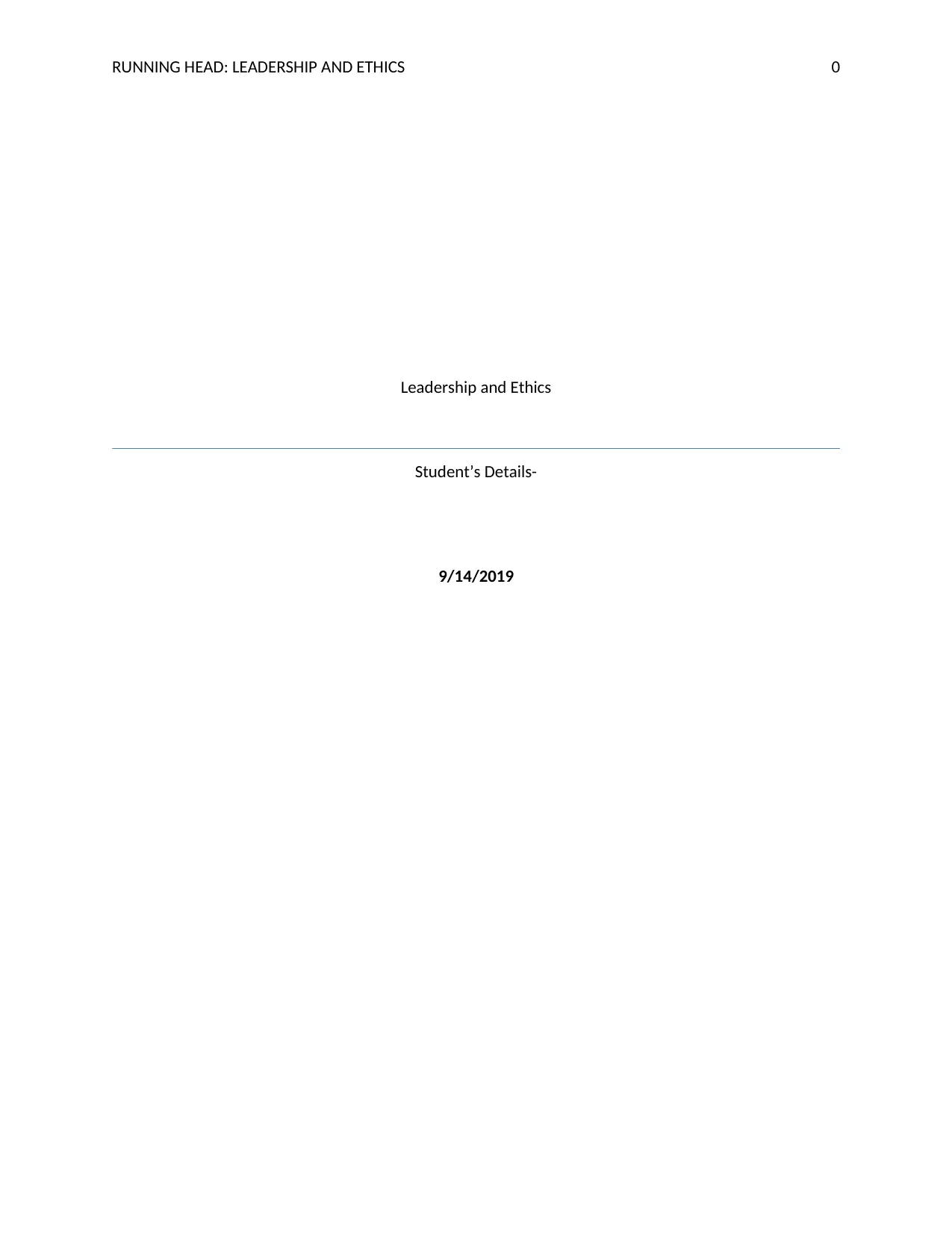
RUNNING HEAD: LEADERSHIP AND ETHICS 0
Leadership and Ethics
Student’s Details-
9/14/2019
Leadership and Ethics
Student’s Details-
9/14/2019
Paraphrase This Document
Need a fresh take? Get an instant paraphrase of this document with our AI Paraphraser
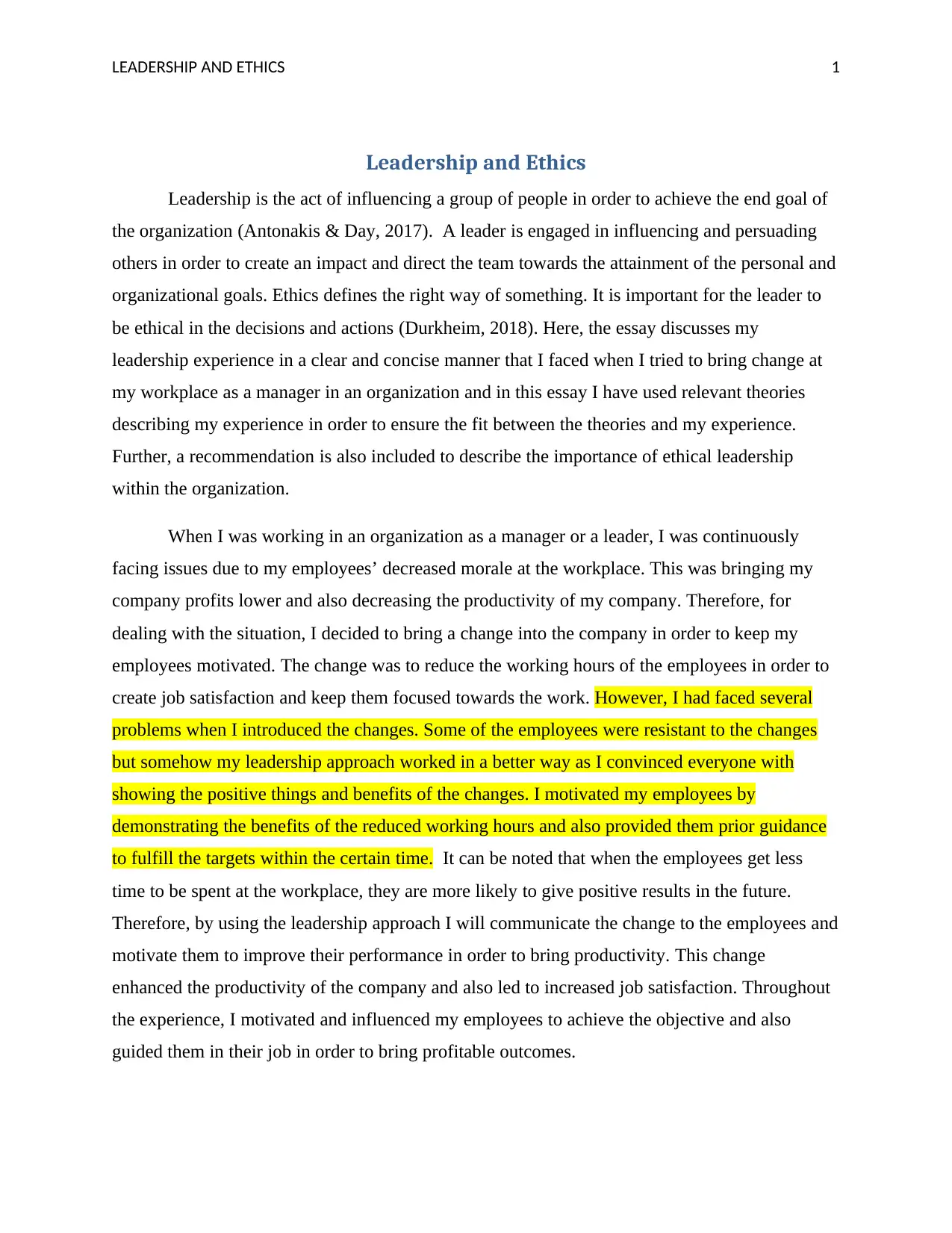
LEADERSHIP AND ETHICS 1
Leadership and Ethics
Leadership is the act of influencing a group of people in order to achieve the end goal of
the organization (Antonakis & Day, 2017). A leader is engaged in influencing and persuading
others in order to create an impact and direct the team towards the attainment of the personal and
organizational goals. Ethics defines the right way of something. It is important for the leader to
be ethical in the decisions and actions (Durkheim, 2018). Here, the essay discusses my
leadership experience in a clear and concise manner that I faced when I tried to bring change at
my workplace as a manager in an organization and in this essay I have used relevant theories
describing my experience in order to ensure the fit between the theories and my experience.
Further, a recommendation is also included to describe the importance of ethical leadership
within the organization.
When I was working in an organization as a manager or a leader, I was continuously
facing issues due to my employees’ decreased morale at the workplace. This was bringing my
company profits lower and also decreasing the productivity of my company. Therefore, for
dealing with the situation, I decided to bring a change into the company in order to keep my
employees motivated. The change was to reduce the working hours of the employees in order to
create job satisfaction and keep them focused towards the work. However, I had faced several
problems when I introduced the changes. Some of the employees were resistant to the changes
but somehow my leadership approach worked in a better way as I convinced everyone with
showing the positive things and benefits of the changes. I motivated my employees by
demonstrating the benefits of the reduced working hours and also provided them prior guidance
to fulfill the targets within the certain time. It can be noted that when the employees get less
time to be spent at the workplace, they are more likely to give positive results in the future.
Therefore, by using the leadership approach I will communicate the change to the employees and
motivate them to improve their performance in order to bring productivity. This change
enhanced the productivity of the company and also led to increased job satisfaction. Throughout
the experience, I motivated and influenced my employees to achieve the objective and also
guided them in their job in order to bring profitable outcomes.
Leadership and Ethics
Leadership is the act of influencing a group of people in order to achieve the end goal of
the organization (Antonakis & Day, 2017). A leader is engaged in influencing and persuading
others in order to create an impact and direct the team towards the attainment of the personal and
organizational goals. Ethics defines the right way of something. It is important for the leader to
be ethical in the decisions and actions (Durkheim, 2018). Here, the essay discusses my
leadership experience in a clear and concise manner that I faced when I tried to bring change at
my workplace as a manager in an organization and in this essay I have used relevant theories
describing my experience in order to ensure the fit between the theories and my experience.
Further, a recommendation is also included to describe the importance of ethical leadership
within the organization.
When I was working in an organization as a manager or a leader, I was continuously
facing issues due to my employees’ decreased morale at the workplace. This was bringing my
company profits lower and also decreasing the productivity of my company. Therefore, for
dealing with the situation, I decided to bring a change into the company in order to keep my
employees motivated. The change was to reduce the working hours of the employees in order to
create job satisfaction and keep them focused towards the work. However, I had faced several
problems when I introduced the changes. Some of the employees were resistant to the changes
but somehow my leadership approach worked in a better way as I convinced everyone with
showing the positive things and benefits of the changes. I motivated my employees by
demonstrating the benefits of the reduced working hours and also provided them prior guidance
to fulfill the targets within the certain time. It can be noted that when the employees get less
time to be spent at the workplace, they are more likely to give positive results in the future.
Therefore, by using the leadership approach I will communicate the change to the employees and
motivate them to improve their performance in order to bring productivity. This change
enhanced the productivity of the company and also led to increased job satisfaction. Throughout
the experience, I motivated and influenced my employees to achieve the objective and also
guided them in their job in order to bring profitable outcomes.
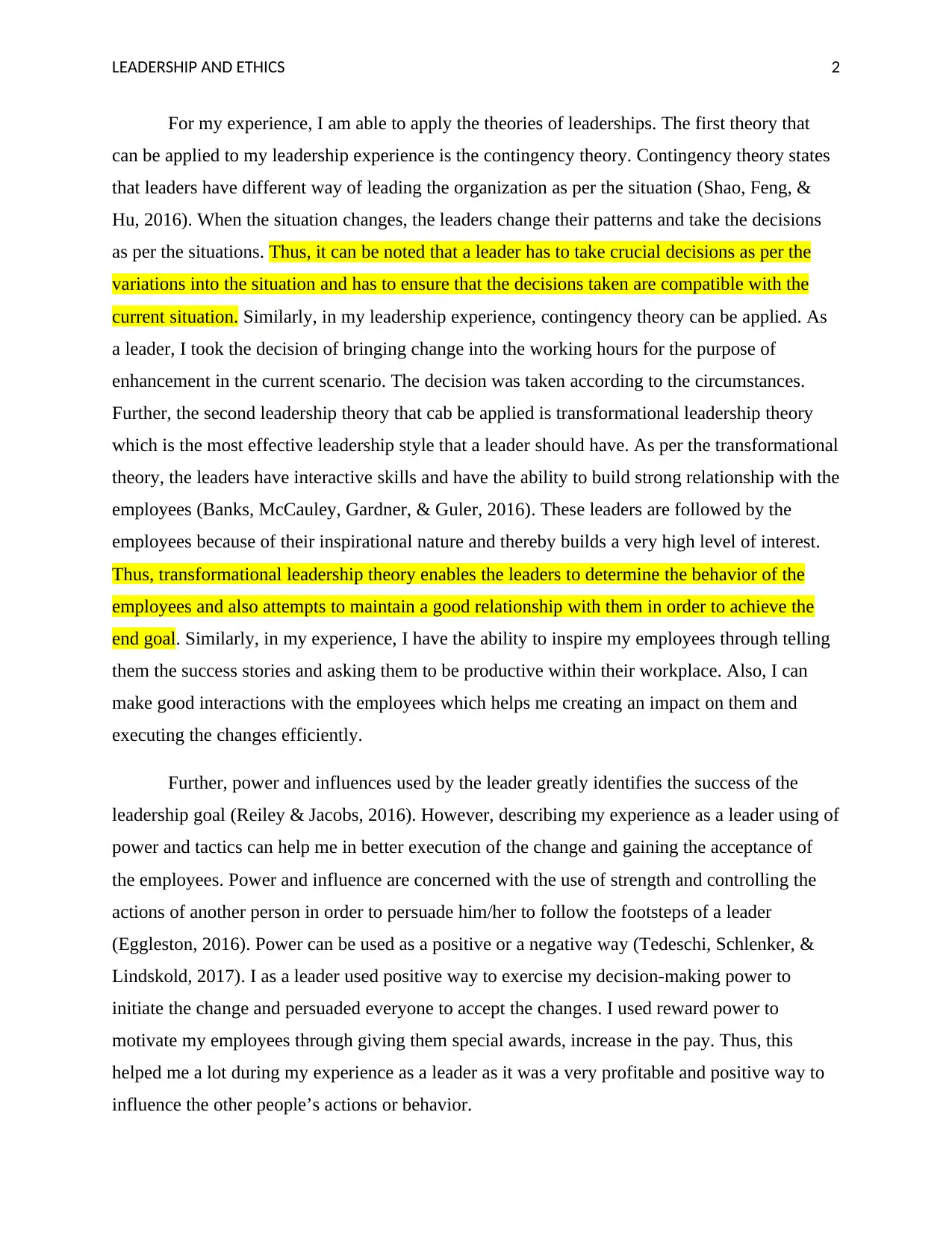
LEADERSHIP AND ETHICS 2
For my experience, I am able to apply the theories of leaderships. The first theory that
can be applied to my leadership experience is the contingency theory. Contingency theory states
that leaders have different way of leading the organization as per the situation (Shao, Feng, &
Hu, 2016). When the situation changes, the leaders change their patterns and take the decisions
as per the situations. Thus, it can be noted that a leader has to take crucial decisions as per the
variations into the situation and has to ensure that the decisions taken are compatible with the
current situation. Similarly, in my leadership experience, contingency theory can be applied. As
a leader, I took the decision of bringing change into the working hours for the purpose of
enhancement in the current scenario. The decision was taken according to the circumstances.
Further, the second leadership theory that cab be applied is transformational leadership theory
which is the most effective leadership style that a leader should have. As per the transformational
theory, the leaders have interactive skills and have the ability to build strong relationship with the
employees (Banks, McCauley, Gardner, & Guler, 2016). These leaders are followed by the
employees because of their inspirational nature and thereby builds a very high level of interest.
Thus, transformational leadership theory enables the leaders to determine the behavior of the
employees and also attempts to maintain a good relationship with them in order to achieve the
end goal. Similarly, in my experience, I have the ability to inspire my employees through telling
them the success stories and asking them to be productive within their workplace. Also, I can
make good interactions with the employees which helps me creating an impact on them and
executing the changes efficiently.
Further, power and influences used by the leader greatly identifies the success of the
leadership goal (Reiley & Jacobs, 2016). However, describing my experience as a leader using of
power and tactics can help me in better execution of the change and gaining the acceptance of
the employees. Power and influence are concerned with the use of strength and controlling the
actions of another person in order to persuade him/her to follow the footsteps of a leader
(Eggleston, 2016). Power can be used as a positive or a negative way (Tedeschi, Schlenker, &
Lindskold, 2017). I as a leader used positive way to exercise my decision-making power to
initiate the change and persuaded everyone to accept the changes. I used reward power to
motivate my employees through giving them special awards, increase in the pay. Thus, this
helped me a lot during my experience as a leader as it was a very profitable and positive way to
influence the other people’s actions or behavior.
For my experience, I am able to apply the theories of leaderships. The first theory that
can be applied to my leadership experience is the contingency theory. Contingency theory states
that leaders have different way of leading the organization as per the situation (Shao, Feng, &
Hu, 2016). When the situation changes, the leaders change their patterns and take the decisions
as per the situations. Thus, it can be noted that a leader has to take crucial decisions as per the
variations into the situation and has to ensure that the decisions taken are compatible with the
current situation. Similarly, in my leadership experience, contingency theory can be applied. As
a leader, I took the decision of bringing change into the working hours for the purpose of
enhancement in the current scenario. The decision was taken according to the circumstances.
Further, the second leadership theory that cab be applied is transformational leadership theory
which is the most effective leadership style that a leader should have. As per the transformational
theory, the leaders have interactive skills and have the ability to build strong relationship with the
employees (Banks, McCauley, Gardner, & Guler, 2016). These leaders are followed by the
employees because of their inspirational nature and thereby builds a very high level of interest.
Thus, transformational leadership theory enables the leaders to determine the behavior of the
employees and also attempts to maintain a good relationship with them in order to achieve the
end goal. Similarly, in my experience, I have the ability to inspire my employees through telling
them the success stories and asking them to be productive within their workplace. Also, I can
make good interactions with the employees which helps me creating an impact on them and
executing the changes efficiently.
Further, power and influences used by the leader greatly identifies the success of the
leadership goal (Reiley & Jacobs, 2016). However, describing my experience as a leader using of
power and tactics can help me in better execution of the change and gaining the acceptance of
the employees. Power and influence are concerned with the use of strength and controlling the
actions of another person in order to persuade him/her to follow the footsteps of a leader
(Eggleston, 2016). Power can be used as a positive or a negative way (Tedeschi, Schlenker, &
Lindskold, 2017). I as a leader used positive way to exercise my decision-making power to
initiate the change and persuaded everyone to accept the changes. I used reward power to
motivate my employees through giving them special awards, increase in the pay. Thus, this
helped me a lot during my experience as a leader as it was a very profitable and positive way to
influence the other people’s actions or behavior.
⊘ This is a preview!⊘
Do you want full access?
Subscribe today to unlock all pages.

Trusted by 1+ million students worldwide
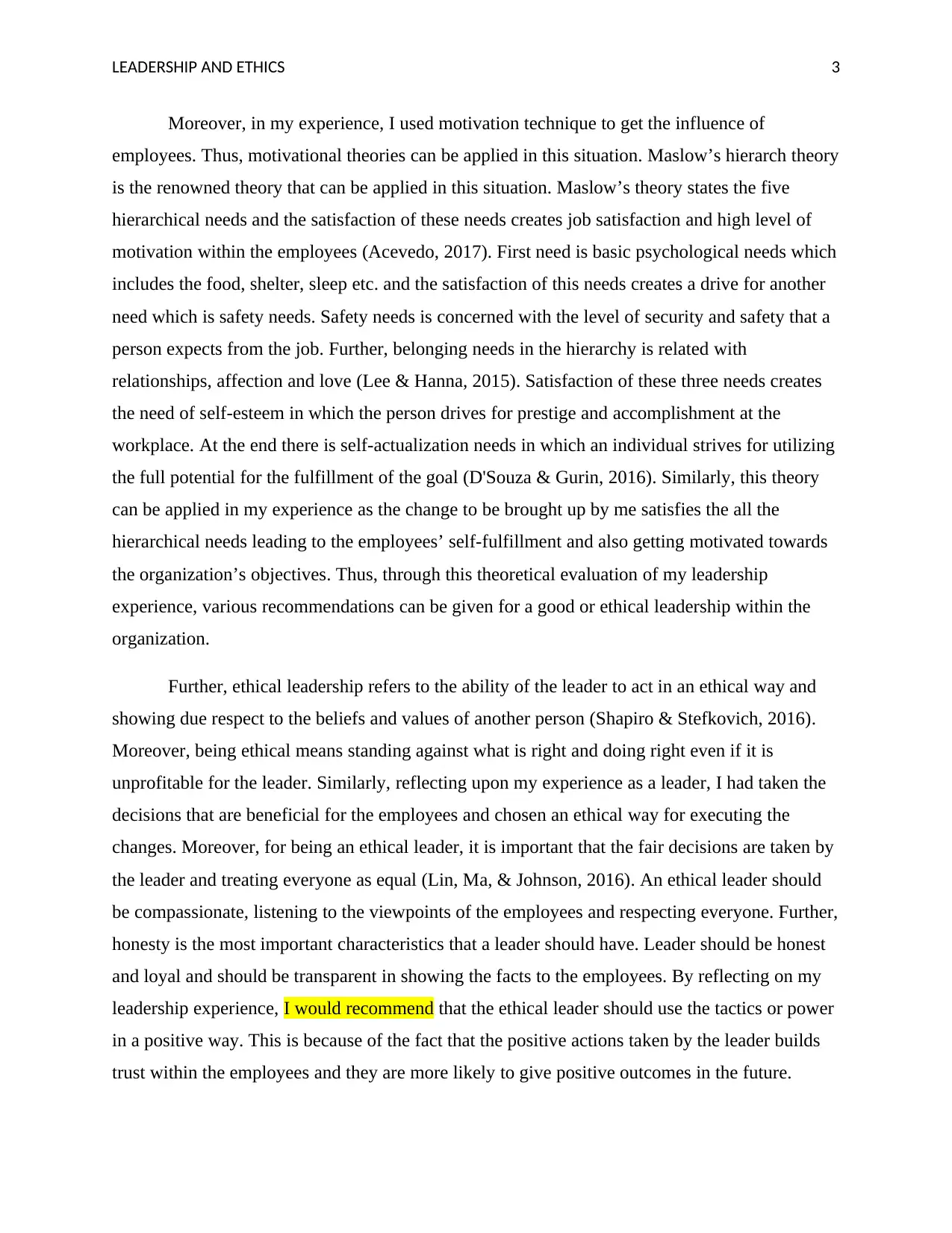
LEADERSHIP AND ETHICS 3
Moreover, in my experience, I used motivation technique to get the influence of
employees. Thus, motivational theories can be applied in this situation. Maslow’s hierarch theory
is the renowned theory that can be applied in this situation. Maslow’s theory states the five
hierarchical needs and the satisfaction of these needs creates job satisfaction and high level of
motivation within the employees (Acevedo, 2017). First need is basic psychological needs which
includes the food, shelter, sleep etc. and the satisfaction of this needs creates a drive for another
need which is safety needs. Safety needs is concerned with the level of security and safety that a
person expects from the job. Further, belonging needs in the hierarchy is related with
relationships, affection and love (Lee & Hanna, 2015). Satisfaction of these three needs creates
the need of self-esteem in which the person drives for prestige and accomplishment at the
workplace. At the end there is self-actualization needs in which an individual strives for utilizing
the full potential for the fulfillment of the goal (D'Souza & Gurin, 2016). Similarly, this theory
can be applied in my experience as the change to be brought up by me satisfies the all the
hierarchical needs leading to the employees’ self-fulfillment and also getting motivated towards
the organization’s objectives. Thus, through this theoretical evaluation of my leadership
experience, various recommendations can be given for a good or ethical leadership within the
organization.
Further, ethical leadership refers to the ability of the leader to act in an ethical way and
showing due respect to the beliefs and values of another person (Shapiro & Stefkovich, 2016).
Moreover, being ethical means standing against what is right and doing right even if it is
unprofitable for the leader. Similarly, reflecting upon my experience as a leader, I had taken the
decisions that are beneficial for the employees and chosen an ethical way for executing the
changes. Moreover, for being an ethical leader, it is important that the fair decisions are taken by
the leader and treating everyone as equal (Lin, Ma, & Johnson, 2016). An ethical leader should
be compassionate, listening to the viewpoints of the employees and respecting everyone. Further,
honesty is the most important characteristics that a leader should have. Leader should be honest
and loyal and should be transparent in showing the facts to the employees. By reflecting on my
leadership experience, I would recommend that the ethical leader should use the tactics or power
in a positive way. This is because of the fact that the positive actions taken by the leader builds
trust within the employees and they are more likely to give positive outcomes in the future.
Moreover, in my experience, I used motivation technique to get the influence of
employees. Thus, motivational theories can be applied in this situation. Maslow’s hierarch theory
is the renowned theory that can be applied in this situation. Maslow’s theory states the five
hierarchical needs and the satisfaction of these needs creates job satisfaction and high level of
motivation within the employees (Acevedo, 2017). First need is basic psychological needs which
includes the food, shelter, sleep etc. and the satisfaction of this needs creates a drive for another
need which is safety needs. Safety needs is concerned with the level of security and safety that a
person expects from the job. Further, belonging needs in the hierarchy is related with
relationships, affection and love (Lee & Hanna, 2015). Satisfaction of these three needs creates
the need of self-esteem in which the person drives for prestige and accomplishment at the
workplace. At the end there is self-actualization needs in which an individual strives for utilizing
the full potential for the fulfillment of the goal (D'Souza & Gurin, 2016). Similarly, this theory
can be applied in my experience as the change to be brought up by me satisfies the all the
hierarchical needs leading to the employees’ self-fulfillment and also getting motivated towards
the organization’s objectives. Thus, through this theoretical evaluation of my leadership
experience, various recommendations can be given for a good or ethical leadership within the
organization.
Further, ethical leadership refers to the ability of the leader to act in an ethical way and
showing due respect to the beliefs and values of another person (Shapiro & Stefkovich, 2016).
Moreover, being ethical means standing against what is right and doing right even if it is
unprofitable for the leader. Similarly, reflecting upon my experience as a leader, I had taken the
decisions that are beneficial for the employees and chosen an ethical way for executing the
changes. Moreover, for being an ethical leader, it is important that the fair decisions are taken by
the leader and treating everyone as equal (Lin, Ma, & Johnson, 2016). An ethical leader should
be compassionate, listening to the viewpoints of the employees and respecting everyone. Further,
honesty is the most important characteristics that a leader should have. Leader should be honest
and loyal and should be transparent in showing the facts to the employees. By reflecting on my
leadership experience, I would recommend that the ethical leader should use the tactics or power
in a positive way. This is because of the fact that the positive actions taken by the leader builds
trust within the employees and they are more likely to give positive outcomes in the future.
Paraphrase This Document
Need a fresh take? Get an instant paraphrase of this document with our AI Paraphraser
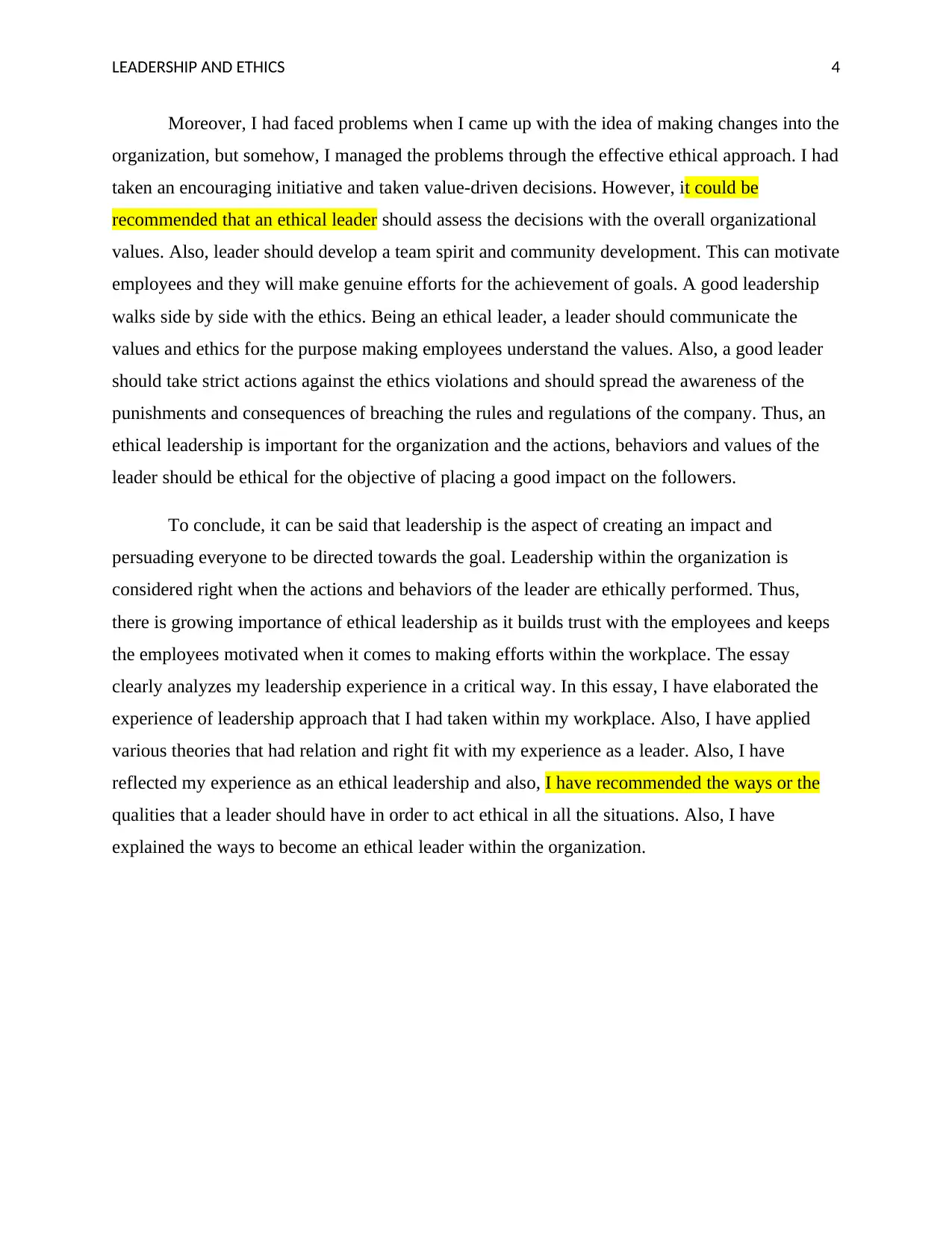
LEADERSHIP AND ETHICS 4
Moreover, I had faced problems when I came up with the idea of making changes into the
organization, but somehow, I managed the problems through the effective ethical approach. I had
taken an encouraging initiative and taken value-driven decisions. However, it could be
recommended that an ethical leader should assess the decisions with the overall organizational
values. Also, leader should develop a team spirit and community development. This can motivate
employees and they will make genuine efforts for the achievement of goals. A good leadership
walks side by side with the ethics. Being an ethical leader, a leader should communicate the
values and ethics for the purpose making employees understand the values. Also, a good leader
should take strict actions against the ethics violations and should spread the awareness of the
punishments and consequences of breaching the rules and regulations of the company. Thus, an
ethical leadership is important for the organization and the actions, behaviors and values of the
leader should be ethical for the objective of placing a good impact on the followers.
To conclude, it can be said that leadership is the aspect of creating an impact and
persuading everyone to be directed towards the goal. Leadership within the organization is
considered right when the actions and behaviors of the leader are ethically performed. Thus,
there is growing importance of ethical leadership as it builds trust with the employees and keeps
the employees motivated when it comes to making efforts within the workplace. The essay
clearly analyzes my leadership experience in a critical way. In this essay, I have elaborated the
experience of leadership approach that I had taken within my workplace. Also, I have applied
various theories that had relation and right fit with my experience as a leader. Also, I have
reflected my experience as an ethical leadership and also, I have recommended the ways or the
qualities that a leader should have in order to act ethical in all the situations. Also, I have
explained the ways to become an ethical leader within the organization.
Moreover, I had faced problems when I came up with the idea of making changes into the
organization, but somehow, I managed the problems through the effective ethical approach. I had
taken an encouraging initiative and taken value-driven decisions. However, it could be
recommended that an ethical leader should assess the decisions with the overall organizational
values. Also, leader should develop a team spirit and community development. This can motivate
employees and they will make genuine efforts for the achievement of goals. A good leadership
walks side by side with the ethics. Being an ethical leader, a leader should communicate the
values and ethics for the purpose making employees understand the values. Also, a good leader
should take strict actions against the ethics violations and should spread the awareness of the
punishments and consequences of breaching the rules and regulations of the company. Thus, an
ethical leadership is important for the organization and the actions, behaviors and values of the
leader should be ethical for the objective of placing a good impact on the followers.
To conclude, it can be said that leadership is the aspect of creating an impact and
persuading everyone to be directed towards the goal. Leadership within the organization is
considered right when the actions and behaviors of the leader are ethically performed. Thus,
there is growing importance of ethical leadership as it builds trust with the employees and keeps
the employees motivated when it comes to making efforts within the workplace. The essay
clearly analyzes my leadership experience in a critical way. In this essay, I have elaborated the
experience of leadership approach that I had taken within my workplace. Also, I have applied
various theories that had relation and right fit with my experience as a leader. Also, I have
reflected my experience as an ethical leadership and also, I have recommended the ways or the
qualities that a leader should have in order to act ethical in all the situations. Also, I have
explained the ways to become an ethical leader within the organization.
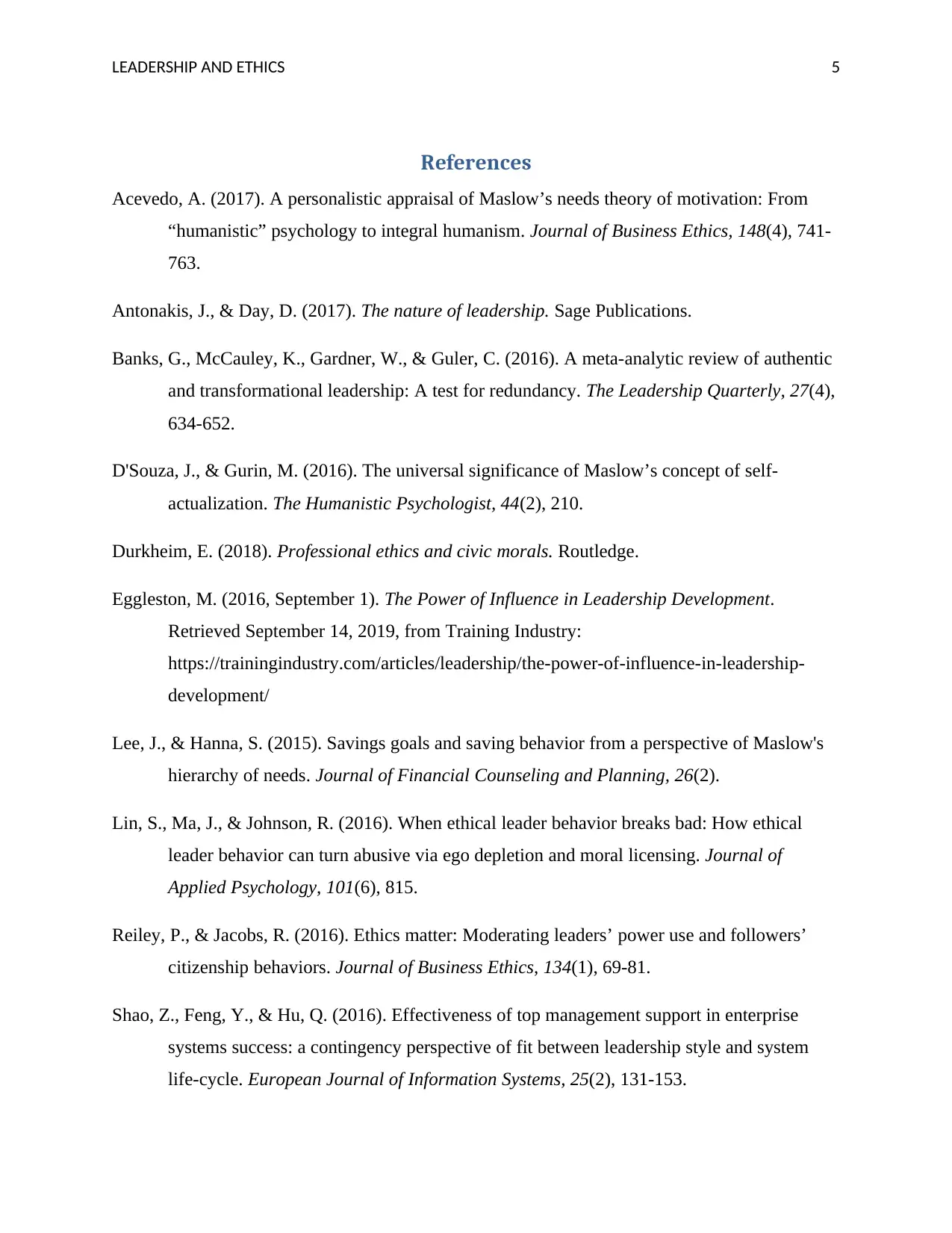
LEADERSHIP AND ETHICS 5
References
Acevedo, A. (2017). A personalistic appraisal of Maslow’s needs theory of motivation: From
“humanistic” psychology to integral humanism. Journal of Business Ethics, 148(4), 741-
763.
Antonakis, J., & Day, D. (2017). The nature of leadership. Sage Publications.
Banks, G., McCauley, K., Gardner, W., & Guler, C. (2016). A meta-analytic review of authentic
and transformational leadership: A test for redundancy. The Leadership Quarterly, 27(4),
634-652.
D'Souza, J., & Gurin, M. (2016). The universal significance of Maslow’s concept of self-
actualization. The Humanistic Psychologist, 44(2), 210.
Durkheim, E. (2018). Professional ethics and civic morals. Routledge.
Eggleston, M. (2016, September 1). The Power of Influence in Leadership Development.
Retrieved September 14, 2019, from Training Industry:
https://trainingindustry.com/articles/leadership/the-power-of-influence-in-leadership-
development/
Lee, J., & Hanna, S. (2015). Savings goals and saving behavior from a perspective of Maslow's
hierarchy of needs. Journal of Financial Counseling and Planning, 26(2).
Lin, S., Ma, J., & Johnson, R. (2016). When ethical leader behavior breaks bad: How ethical
leader behavior can turn abusive via ego depletion and moral licensing. Journal of
Applied Psychology, 101(6), 815.
Reiley, P., & Jacobs, R. (2016). Ethics matter: Moderating leaders’ power use and followers’
citizenship behaviors. Journal of Business Ethics, 134(1), 69-81.
Shao, Z., Feng, Y., & Hu, Q. (2016). Effectiveness of top management support in enterprise
systems success: a contingency perspective of fit between leadership style and system
life-cycle. European Journal of Information Systems, 25(2), 131-153.
References
Acevedo, A. (2017). A personalistic appraisal of Maslow’s needs theory of motivation: From
“humanistic” psychology to integral humanism. Journal of Business Ethics, 148(4), 741-
763.
Antonakis, J., & Day, D. (2017). The nature of leadership. Sage Publications.
Banks, G., McCauley, K., Gardner, W., & Guler, C. (2016). A meta-analytic review of authentic
and transformational leadership: A test for redundancy. The Leadership Quarterly, 27(4),
634-652.
D'Souza, J., & Gurin, M. (2016). The universal significance of Maslow’s concept of self-
actualization. The Humanistic Psychologist, 44(2), 210.
Durkheim, E. (2018). Professional ethics and civic morals. Routledge.
Eggleston, M. (2016, September 1). The Power of Influence in Leadership Development.
Retrieved September 14, 2019, from Training Industry:
https://trainingindustry.com/articles/leadership/the-power-of-influence-in-leadership-
development/
Lee, J., & Hanna, S. (2015). Savings goals and saving behavior from a perspective of Maslow's
hierarchy of needs. Journal of Financial Counseling and Planning, 26(2).
Lin, S., Ma, J., & Johnson, R. (2016). When ethical leader behavior breaks bad: How ethical
leader behavior can turn abusive via ego depletion and moral licensing. Journal of
Applied Psychology, 101(6), 815.
Reiley, P., & Jacobs, R. (2016). Ethics matter: Moderating leaders’ power use and followers’
citizenship behaviors. Journal of Business Ethics, 134(1), 69-81.
Shao, Z., Feng, Y., & Hu, Q. (2016). Effectiveness of top management support in enterprise
systems success: a contingency perspective of fit between leadership style and system
life-cycle. European Journal of Information Systems, 25(2), 131-153.
⊘ This is a preview!⊘
Do you want full access?
Subscribe today to unlock all pages.

Trusted by 1+ million students worldwide
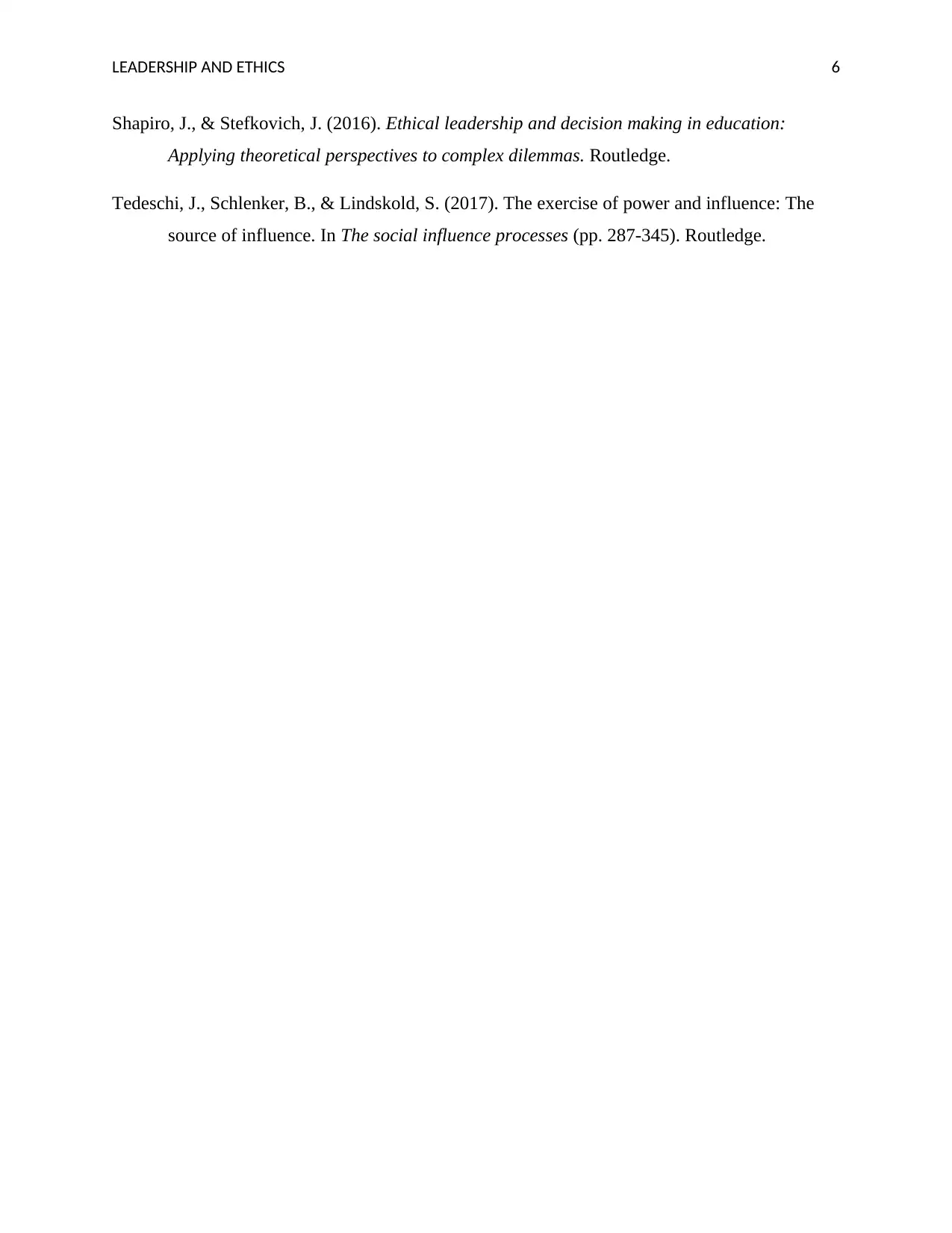
LEADERSHIP AND ETHICS 6
Shapiro, J., & Stefkovich, J. (2016). Ethical leadership and decision making in education:
Applying theoretical perspectives to complex dilemmas. Routledge.
Tedeschi, J., Schlenker, B., & Lindskold, S. (2017). The exercise of power and influence: The
source of influence. In The social influence processes (pp. 287-345). Routledge.
Shapiro, J., & Stefkovich, J. (2016). Ethical leadership and decision making in education:
Applying theoretical perspectives to complex dilemmas. Routledge.
Tedeschi, J., Schlenker, B., & Lindskold, S. (2017). The exercise of power and influence: The
source of influence. In The social influence processes (pp. 287-345). Routledge.
1 out of 7
Related Documents
Your All-in-One AI-Powered Toolkit for Academic Success.
+13062052269
info@desklib.com
Available 24*7 on WhatsApp / Email
![[object Object]](/_next/static/media/star-bottom.7253800d.svg)
Unlock your academic potential
Copyright © 2020–2026 A2Z Services. All Rights Reserved. Developed and managed by ZUCOL.




